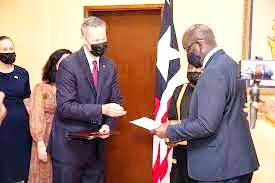U.S. Criticizes Pres. Weah Fight against Human Trafficking

U.S. State Department noted that the Weah administration “identified fewer victims, initiated fewer investigations, prosecuted fewer defendants, and did not convict any traffickers
-- Says the Liberia not doing enough to eliminate human trafficking of all kinds
Liberia, under the administration of President George Manneh Weah, has been downgraded to Tier 2 Watch List for failing to “meet the minimum standards for the elimination of trafficking.”
According to its annual report on Trafficking in Persons, the U.S. State Department noted that the Weah administration “identified fewer victims, initiated fewer investigations, prosecuted fewer defendants, and did not convict any traffickers. Law enforcement officials continued to lack adequate resources and understanding of trafficking to effectively investigate and prosecute trafficking crimes. Shelter services for victims remained insufficient, and the government did not support NGOs providing care to victims.”
Meanwhile, in spite of the downgrade of status, the US government said the Liberian government did make “significant efforts to” meet minimum standards. These efforts included opening a new shelter for child trafficking victims, initiating an investigation into a high-profile labor trafficking case in cooperation with foreign governments, and allocating funding to NGOs to conduct awareness raising campaigns.”
But these efforts, significant as they were, could not help Liberia under Weah avoid the downgrade.
“The government maintained insufficient efforts to identify and protect trafficking victims. Liberian nationals and—to a lesser extent—foreigners exploit children in sex trafficking in Monrovia. Traffickers allegedly compel children to sell illicit drugs. [Also] the government did not provide the LNP with dedicated anti-trafficking funding or in-kind support, and it lacked basic resources and equipment to fully respond to and investigate allegations of trafficking, especially outside the capital,” the State Department report said.
It further states that law enforcement occasionally accepted bribes from suspected traffickers to end investigations, and some government employees may have been directly complicit in child trafficking, including for domestic servitude and street vending.
“The government did not report any investigations, prosecutions, or convictions of government officials complicit in human trafficking offenses; however, corruption and official complicity in trafficking crimes remained significant concerns, inhibiting law enforcement action during the year,” the report added.
Upgraded one year earlier
The report, which was published July 1, 2021 comes a year after the country under the administration of President Weah was upgraded to Tier 2 for making significant efforts to bring themselves into compliance with those minimum standards eliminating trafficking in Persons.
Announcing the upgrade in 2020, the U.S. State Department said that although the government did not fully meet the minimum standards for eliminating trafficking, significant effort was made to do so.
The report cited “increased investigations of internal trafficking; allocation of budget to the anti-trafficking task force for the first time since 2014; promulgating a national referral mechanism; and identifying more potential trafficking victims, including child victims of domestic trafficking as some reasons for the upgrade then.
However, a year later, the U.S statement reversed the upgrade and demoted Liberia to its Tier 2 Watch List of nations that deserve special scrutiny for failing “to provide evidence of increasing efforts to combat severe forms of trafficking in persons from the previous year.”
Now downgraded, Liberia moved back to the position it held for three years before last year’s elevation after significant progress towards combating Trafficking in Persons.
In determining Tiers 2 and 3, the U.S. State Department considers the overall extent of human trafficking in the country; the extent of government non-compliance with the minimum standards, particularly the extent to which government officials have participated in, facilitated, condoned, or otherwise were complicit in trafficking; and, what measures are reasonable to bring the government into compliance with the minimum standards in light of the government’s resources and capabilities.
‘346 calls, no report’
The report further said that the government of Liberia under the leadership of President Weah received 346 credible calls during the reporting period (April 1, 2020, to March 31st of 2021), but did not report initiating any investigations or identifying any victims as a result.
The report further said that the government’s insufficient efforts to identify and protect trafficking victims led to the identification of 29 trafficking victims in 2020, “compared with identifying seven trafficking victims and 60 potential trafficking victims during the previous reporting period. “
“Of the 29 victims, authorities identified 11 victims from Cote d’Ivoire, Guinea, Mali, and Sierra Leone as part of a fraudulent recruitment investigation; the government provided shelter and necessities to the 11 victims but could not account for all of the victims’ whereabouts at the end of the reporting period,” the State Department added.
It noted that officials continued to demonstrate a lack of understanding of internal trafficking, and some continued to view forms of trafficking, especially forced labor of children in domestic servitude, as a community practice rather than a crime.
According to the report, prosecutors would pursue other charges, including rape and child endangerment, “in lieu of sex trafficking or child forced labor due to a lack of understanding of human trafficking.”
“As reported over the past five years, human traffickers exploit domestic and foreign victims in Liberia, and traffickers exploit victims from Liberia
abroad. Trafficking within the country is more prevalent than transnational trafficking, and the majority of victims are children.
“Traffickers recruit and exploit most victims within the country’s borders in domestic servitude, forced begging, sex trafficking, or forced labor in street vending, gold and alluvial diamond mines, and on small-scale rubber plantations,” the report said.

